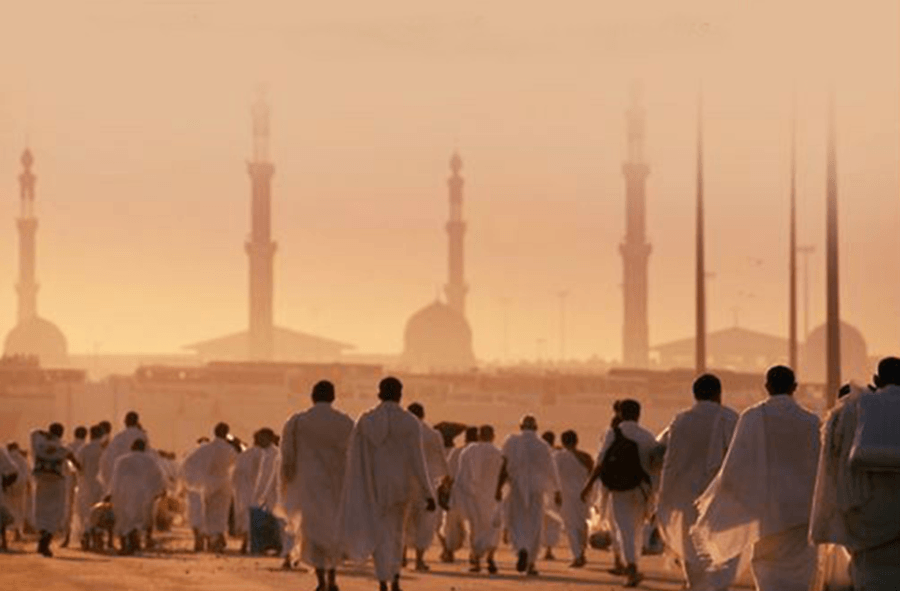
SPIRITUALITY IN PILGRIMAGE (HAJJ)
By Dr Muhammad Solaiman
Introduction
Islam is a unique religion. It is a complete way of life prescribed by God for mankind. Islam was conveyed by all the prophets of God (peace be upon them, PBUT) starting with Adam who is considered the first prophet and ending with Muhammad, who is the seal of the prophets of God. Therefore, Islam has been the universal message of God to mankind.
The Hajj, the pilgrimage to Makkah, is the fifth pillar of Islam. It is a religious duty that Muslims should undertake if they are able, at least once in their lives.
In this article, we will deal with the spirituality attained by pilgrims through Hajj. To learn more about the spirituality in Islam in general, please return to our book Spirituality in Yoga, Christianity and Islam.
What is unique about the spirituality of Islam?
- Spirituality in Islam is real and divinely prescribed
Islam has a unique advantage as it is based on Glorious Qur’an and the tradition of the Prophet Muhammad (PBUH) which were perfectly preserved. Therefore As the spirituality gained through Islam is based on authentic sources, it is authentic and divine.
“Today I have perfected your religion for you, and have completed My favour upon you and have approved Islam as a religion for you” (Qur’an 5:3).
- Spirituality in Islam is self-protected
The first source of Islam which is the Qur’an is the words of Allah. It was recorded word for word and revised under the supervision of the Prophet Muhammad (PBUH). It is the only Divine Book, which has been memorised by heart by millions of people. The tradition of the Prophet Muhammad (PBUH), which is the second source of Islam (the Sunnah) was also perfectly collected and preserved.
Since spirituality in Islam is based on the Qur’an and Sunnah, any innovation would be rejected and considered heresy.
- Spirituality in Islam is persistent
One of the unique characteristics of Islam is that it is a complete way of life. Since the Muslim wakes up in the morning until he goes to bed at night, he is conscious of God. Therefore, Islam keeps the Muslim connected to God 24 hours a day and 365 days a year.
Interestingly, while Islam uniquely keeps the Muslim conscious of God all the time, the Muslim can practise his ordinary daily life. In other words, the Muslim does not need to abandon his society and stay in a monastery to gain spirituality.
- Spirituality in Islam is attained by diverse methods
The Muslim nourishes his soul by practising diverse acts of worship. He keeps the five regular physical prayers (Salat), charity (Zakat), fasting (Sawm) and pilgrimage. In addition, there are other different practices which could be done most of the time without distracting him from his daily life. Examples are:
-
- Daily recitation of the Glorious Qur’an: The Qur’an, as mentioned before, is the real words of God. It links the Muslim to the divine benevolence and heals his spiritual ailments.
“And We send down from the Quran that which is a healing and a mercy to the believers and it increases the unjust nothing but loss” (Qur’an 17:82).
-
- Supplication: Through supplication, the Muslim converses directly with God any time and builds up intimacy, confidence, love and longing to Him.
- Remembrance of God: This could be done at any time and anywhere by praising the perfect attributes of God.
“O, you who believe, remember God with frequent remembrance. And glorify Him morning and evening” (Qur’an 33:41-42).
-
- Seeking God’s forgiveness: We all do mistakes, forget and sin. God knows our weaknesses and fallibility. Therefore, out of His love, God forgives us. Seeking God’s forgiveness could be done at anytime and anywhere.
- Remembering God in all actions and seeking His help: the Muslim always starts everything in the name of God and seeks His help before starting anything. For example, The Muslim says a supplication (Dua’a), before going to bed and after waking up; before and after eating and even before and after an intimate relationship with his wife.
Hajj Spirituality
God commanded the Prophet Abraham (PBUH) to call people to perform pilgrimage to His sacred House of worship in Makkah.
“And proclaim among men the pilgrimage: they shall come to you on foot and upon every lean camel; they shall come from every deep ravine” (Quran 22:27).
Hundreds of millions of Muslim pilgrims from all continents have been performing Hajj for more than 1400 years. They perform the rituals of Hajj exactly as done by the Prophet Muhammad (PBUH).
The rituals, practices and the atmosphere of Hajj are divinely designed that the pilgrim gains a unique and long lasting spirituality.

Why is Hajj spirituality so unique?
During Hajj, the Muslim invokes the devotion, obedience, sincerity and sacrifices of Abraham, his wife Hagar, his son Ishmael and his descendant Muhammad (PBUT). Therefore, in the atmosphere of Hajj, Muslims enjoy a unique and marvellous spirituality, based on the prophetic sincerity and devotion to God.
During the days of Hajj, Muslims occupy all their time with diverse and intensive practices of rituals which boost the spirituality of the pilgrim to exceptionally high levels and bring him closer to God.
On the other hand, rituals and practices of Hajj wash off sins of the pilgrim and clean up his heart. The more the heart is cleared from sins the more it becomes receptive for higher levels of spirituality. By the end of Hajj, the Muslim would shed off all his sins and enjoy a unique level of spirituality.
In addition, the impact of the experienced spirituality on the pilgrim is deep and long-lasting in keeps the pilgrim on the Straight Path of God.
How does Hajj boost the spirituality of the pilgrims?
- Through full devotion to worshipping God
Pilgrims spend all their time with full attention and complete devotion to worshipping God. They remember while, praying their five regular prayers (Salat), giving charity, reciting the Qur’an, supplicating to God, repenting for their mistakes and asking Him forgiveness. In addition, before and after anything they keep saying the Talbiah of Hajj:
Labaika Allahumma Laabaik. Labaika La Sharika Laka Labaik. Inna-Al Hamda Wa Al-Nemata Laka Wa Al Mulk. La Sharika Lak.
O, my Lord, here I am. Here I am associating no partners to You. Verily, all praise is for You. Every bounty is from You and all Sovereignty is Yours. You have no partner.
This Talbiah is said loudly before, during and after all the actions of pilgrims, whether they are travelling, sitting, walking, travelling or lying down. It expresses the spirit of submission of the pilgrim to God, the One and the acknowledgement of God’s Sovereignty and bounty.
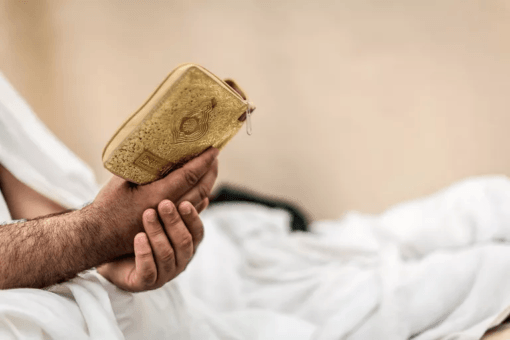
- Through full submission and obedience of God
God commanded Abraham to take his wife and her baby, Ishmael, to the Arabian Desert and leave them alone in the arid Arabian Desert. Abraham and Hagar (PBUT) obeyed God without hesitation. They didn’t wonder how or why to leave the mother and the baby in a barren desert, where there are no inhabitants, cultivation or water.
By performing Hajj, the pilgrim practically confirms his full submission to the commandments of God. He sacrifices his money, comfort and the company of whom he loves. He practically demonstrates to God that nothing in this life equals pleasing Him.
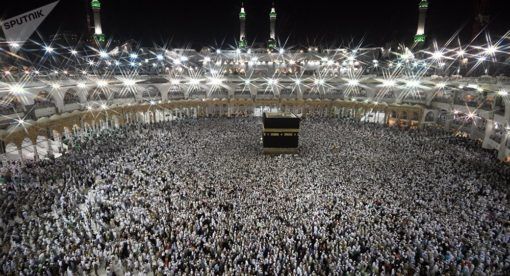
- Through trust and reliance on God
Before leaving Hagar and Ishmael in the Arabian, Hagar said, “O Abraham! To whom are you leaving us in this barren valley? It is not inhabited”. She repeated the question several times and Abraham did not reply. Then she asked: “Has God commanded you to do so?” He said: “Yes”. Then she said: “I am satisfied that God will never abandon us”.
This story reflects the full reliance of Abraham and Hagar on God, the Most Compassionate and the Most Merciful. They were confident that He would take care of Hagar and her child. All Abraham did was to call upon God to care for his wife and son.
“Our Lord, I have settled some of my offspring in a valley of no vegetation by Your Sacred House, our Lord, so that they may perform the prayers. So make the hearts of some people incline towards them, and provide them with fruits, that they may be thankful” (Qur’an 14:37).
This spirit of full confidence, trust and reliance on God is one of the major lessons the pilgrim experiences and learns during Hajj. The journey of Hajj may take days, weeks or months. The pilgrim needs to secure maintenance for his family. However, the reliance on God and making Dua’a (supplication) for Him to protect and maintain his family is essential.
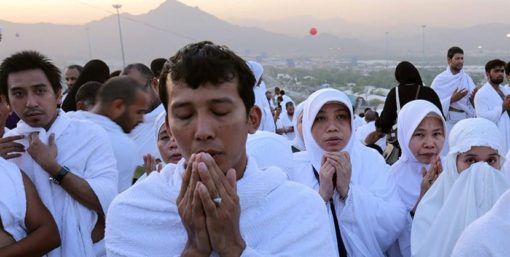
- Through true and real sacrifices
Anybody may claim his love of God. However, when it comes to proving his claims by sacrificing something dear to him, he may hesitate. In the story of Abraham, we find him prepared to sacrifice even his only son, when he was commanded to slay him.
To perform Hajj, the Muslim leaves behind his wealth, business, job, family, and comfortable life and takes the hardship, pain and discomfort of the long journey of Hajj. In addition, the pilgrim has to pay a lot of money for the journey of Hajj. These sacrifices are real, true and practically express the love of God. Therefore, the pilgrim enters God’s sphere of satisfaction, a fact that boosts up his spirituality.
- Through the pilgrim’s simple dress of Hajj
During Hajj, male pilgrims wear a unified dress which consists of two plain white textile strips. Women also put simple dresses.
The use of simple dresses by all pilgrims has a great and deep impact on pilgrim’s spirituality because:
- It demonstrates how Muslims are equal in front of God, regardless of their races, tribes, nations, wealth or social status.
- It demonstrates how Muslims are humble and poor for God’s love and reward.
- It prepares the pilgrim to enter into a personal internal spiritual sanctuary, before entering the sanctuary of the house of worship of God in Makkah.
- The dress looks like the death shroud (the grave clothes), and therefore, it reminds the pilgrim that this life is just a journey to the permanent life to come.
- It takes the pilgrim from the worldly glamorous materialistic life, career, wealth, position and social status and puts him in a simple life.
- By embodying the lives of the prophets
During Hajj, the pilgrim walks in the footsteps of the Prophet Abraham, his wife, and his son. In addition, the pilgrim performs Hajj, in the same way, taught to us by the Prophet Muhammad, the descendant of the Prophet Abraham (PBUT). Therefore, in Hajj pilgrims feel and enjoy the marvellous spirituality of the prophetic acts of worship.
- By recalling the Day of Judgement
Hajj, in a way, symbolises death because, before Hajj journey, the pilgrim closes his accounts and transactions with everyone, seeks forgiveness from those in his known people circle and repay his debts. The pilgrim also arranges for the care of his family members. All these actions remind the pilgrim that he should prepare himself for the Hereafter before leaving this world.
On the other hand, the type of simple dress and the presence of the pilgrim among millions of people remind him of the resurrection day and the gathering of people at the Day of Judgement. This keeps the momentum for the pilgrim to do his best to satisfy God before, during and after Hajj.
- By quitting the worldly engagements
The journey of Hajj gives the mind the opportunity to completely Quite apart from the materialistic world. It gives him a break from the agony of thinking about too many worldly materialistic things.
During the pilgrimage, the mind of the pilgrim focuses only on the rituals performed in order to gain God’s satisfaction and forgiveness.
“And he that venerates the symbols of God, it surely is from the devotion of the heart” (Quran 22:32).
- By hoping to get a new page of life
Pilgrimage is a journey to God to achieve forgiveness and purification from all sins. God rewards the pilgrims for their love, devotion and sincerity to be forgiven and start a new page of life after Hajj.
The freedom from sins and the beginning of a new page of life, uniquely reform the heart and mind of the pilgrim to achieve higher levels of spirituality, clarity and satisfaction.
- Through the experience of global brotherhood
Hajj is considered the biggest international meeting, where millions of Muslims from all over the world come together. The brotherhood of pilgrims towers above the narrow considerations of race, nationality, colour, social level or language.
“O, people! We created you from a male and a female and made you races and tribes, that you may know one another. The best among you in the sight of God is the most righteous” (Qur’an 49:13).
Every pilgrim tries to be humble and patient when he deals with his Muslim brothers and sisters. Therefore, during Hajj, pilgrims experience and enjoy the feeling of love and solidarity of their fellow Muslims. In addition, Hajj creates a unique atmosphere of universal brotherhood and unity. On the other hand, to be amongst millions of sincere and devoted Muslims, as such, potentiates the spirituality of the pilgrim.
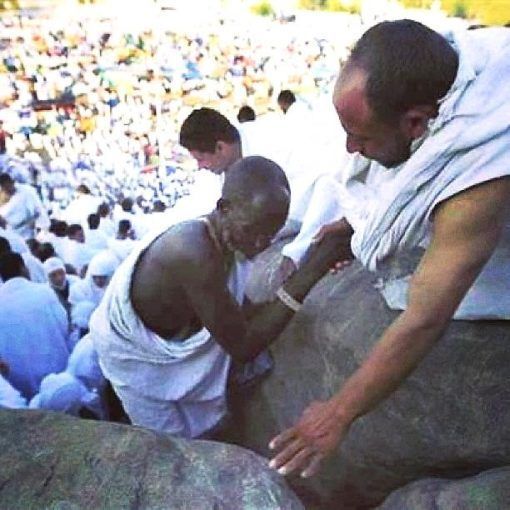

- Through the triumph over the devil
Satan tried three times to dissuade Abraham from obeying God’s order to sacrifice his son, Ishmael. One of the rituals of Hajj is the stoning of three pillars that symbolise the devil. This ritual symbolises the defeat of Satan and the importance of seeking refuge in God.
“And if an evil suggestion comes to you from Satan, then seek refuge in God. Indeed, He is the Hearing, the Knowing” (Qur’an 41:36).
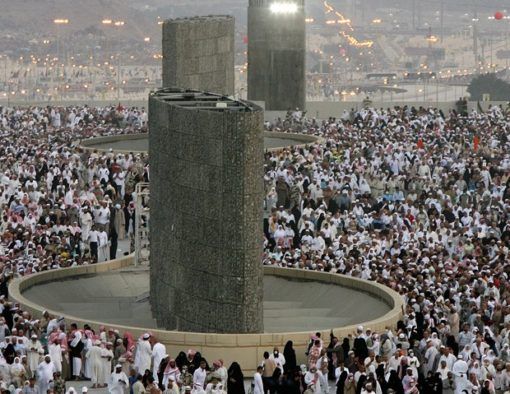
- Through patience and endurance
One of the lessons we learn from the story of Abraham (PBUH) is his patience and endurance. His people rejected him and refused to believe in God. They threw him into a fire and enforced him to leave his hometown. All this did not shake his patience in conveying the message of God.
Patience is essential for pilgrims to be able to travel from their home countries, complete the rituals of Hajj amongst millions of other pilgrims and safely return back to their home countries. The patience of pilgrims creates tranquillity and boosts the spirituality of the pilgrim.
- By enjoying the atmosphere of Hajj security
Hajj creates a unique safe atmosphere where not only humans but also all living creatures, including animals and plants, are safe and inviolable. Therefore, Muslims during Hajj enjoy complete safety and security. This unique safe atmosphere enables the pilgrim to concentrate on his rituals and not to be distracted from gaining higher spirituality levels.
“There are no sexual relations and no disobedience and no disputing during Hajj” (Qur’an 2:197).
Conclusion
The pilgrim, with his free choice, leaves behind his family, home, wealth, position and everything dear to him to perform Hajj. He is prepared to spend all his life-savings to accomplish his journey to God.
During Hajj, the pilgrim performs different rituals and practices which purify his heart and psychologically prepare him to experience a unique climax of spirituality. He also experiences the universal brotherhood and the sincere solidarity of Muslims, which towers above race, nationality, colour and language.
The pilgrim concludes his journey with gratitude to God who has enabled him to complete his Hajj journey. He hopes to have been accepted as the Prophet Mohammed (PBUH) said: “There is no reward for an accepted Hajj except Paradise”.
The pilgrim usually concludes his Hajj determined to keep his devotion to God and maintain the unique spirituality he experienced during Hajj.

